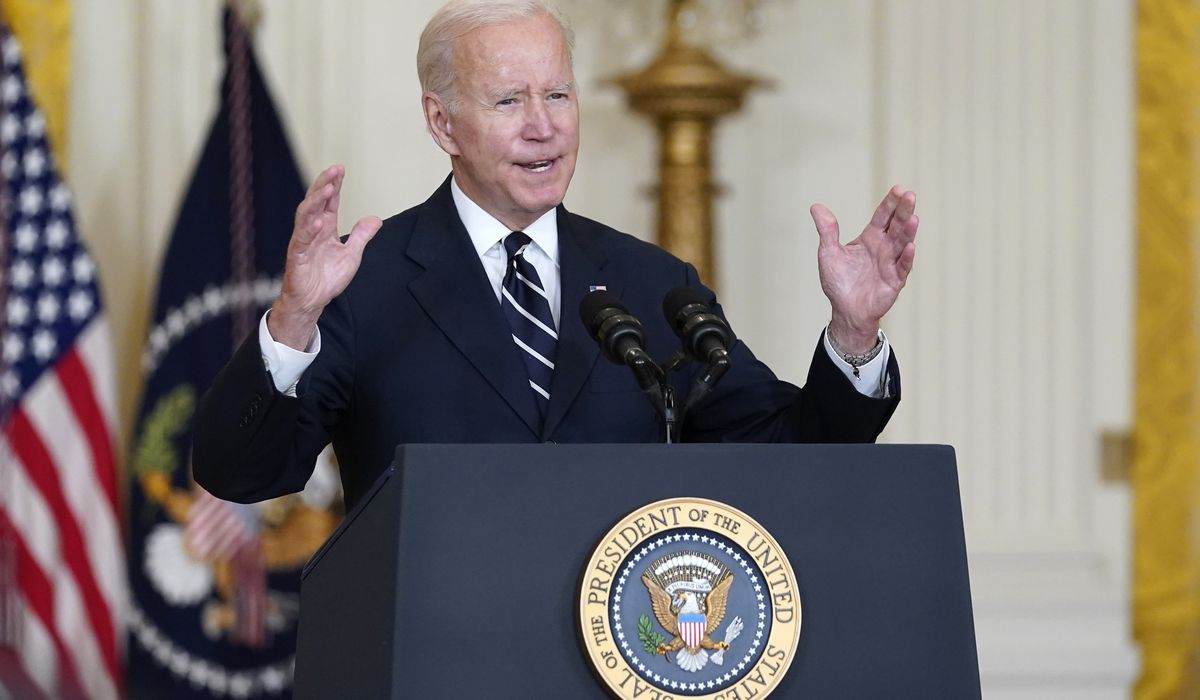
Democratic lawmakers ignored the “framework agreement” President Biden offered for a $1.75 trillion expansion of the federal safety net, dealing him an embarrassing blow to his credibility as he jetted to Europe to meet with world leaders.
Mr. Biden, after months of delay, shocked Washington on Thursday by announcing he had the basis for a deal on the long-sought social welfare and climate change bill. While the package’s overall price tag was far short of the $3.5 trillion originally proposed, Mr. Biden heralded the compromise that would bring together his fractured Democratic Party.
“No one got everything they wanted, including me, but that’s what compromise is,” Mr. Biden said. “I know how deeply people feel about the things that they fight for, but this framework includes historic investments in our nation and in our people … they’re truly consequential.”
House Speaker Nancy Pelosi underscored the high stakes for Mr. Biden as he headed to separate meetings with Pope Francis, the Group of 20 major economic powers and a world climate change summit in Glasgow.
“What this legislation will do is to help the president meet his goals, the goals of America,” said Mrs. Pelosi, California Democrat. “When he goes to meetings with the G-20 now and then to meet His Holiness, the pope, and to go to Glasgow, we want him to go as strong as possible.”
Within hours, it was obvious the rifts remained among congressional Democrats and a deal would not quickly solidify. Hopes that the framework would clear the way for a vote on a separate $1.2 trillion bipartisan infrastructure deal also were dashed.
Further complicating a broad acceptance of Mr. Biden’s framework was moderate Democratic Sens. Joe Manchin III of West Virginia and Kyrsten Sinema of Arizona, key swing votes in the chamber, refusing to say whether they are on board with the deal.
“After months of productive, good-faith negotiations … we have made significant progress on the proposed budget reconciliation package,” Ms. Sinema said in a statement. “I look forward to getting this done, expanding economic opportunities and helping everyday families get ahead.”
Mr. Manchin has similarly been vague, arguing that everyone was “dealing in good faith,” but stopping short of endorsing the framework.
The framework includes the largest expansion of federal health care coverage since the Affordable Care Act. It plans to offer four years of subsidized health insurance for low-income families in states that have yet to expand Medicaid.
It also includes a one-year extension of the expanded child tax credit, on top of six years of childcare subsidies and universal pre-kindergarten for all 3- and 4-year-olds.
To combat climate change, he is proposing $320 billion in clean energy tax credits, along with $105 billion for environmental resilience programs and a Civilian Climate Corps.
Another $100 billion is earmarked to reduce immigration backlogs, expand legal representation and bolster the border processing system.
While few Democrats have publicly disparaged the deal, lawmakers are privately admitting that negotiations are far from the finish line.
“There’s a great deal of uncertainty within the caucus as to what’s contained in the deal,” said Senate Majority Whip Richard J. Durbin, an Illinois Democrat.
Far-left Democrats, most notably, are fretting over everything that’s been cut from the deal. From free community college to a millionaire’s tax, the proposal negotiated by Mr. Biden is short on liberal priorities.
A particular sticking point is Mr. Biden’s decision to jettison a federal guarantee for every worker to receive between four and 12 weeks of paid leave. The decision came after pushback from Mr. Manchin.
Since Democrats plan to push the package through the Senate along party lines using budget reconciliation, a process allowing spending measures to pass the 50-50 split upper chamber by a simple majority, Mr. Biden can’t afford any disunity.
Advocates of paid leave say the fight is far from over and are committed to having it included in the package.
“I’m going to keep proposing versions that he might be able to accept until I can get him to ‘yes,’” Sen. Kristen Gillibrand, New York Democrat, said of her pressuring Mr. Manchin. “I’m bringing him various ideas … about how to include paid leave in the final hour.”
Other lawmakers are similarly committed to their pet projects.
Senate Budget Committee Chairman Bernard Sanders, a democratic socialist from Vermont, is prodding Mr. Biden to reconsider gutting planned Medicare benefits for vision and dental coverage. Mr. Sanders has made the provisions a “red line” for his support.
While the new benefits, along with a measure allowing Medicare to negotiate down drug prices, are popular with progressives, they failed to pass muster with moderates.
In the end, Mr. Biden bowed to political reality and dropped the vision and dental benefit, as well as the prescription drug scheme. However, the framework does include new Medicare benefits for hearing services.
That is by no means enough for far-left lawmakers.
“For years, we have been talking about lowering the cost of prescription drugs and that is not in the bill. … I would say you have the outline of a very significant piece of legislation,” Mr. Sanders said. “This is a very big [bill], I want to see it made even stronger.
Progressives are not the only ones unwilling to compromise. Moderate Democrats, especially those representing high-tax states in the Northeast and the West, threatened a revolt unless the bill includes a federal income tax break that mostly benefits blue states, known as the State and Local Tax or SALT deduction.
“I’ve learned a long time to say no and absolutes, but I cannot imagine that this can get all the votes necessary without some SALT,” said Sen. Robert Menedez, a New Jersey Democrat. “The framework is not a final product as far as I’m concerned.”
SALT allows individuals to write off certain taxes they pay to state and local governments. It once provided significant tax relief in states like New York and California, where the local tax burden is heavy.
Former President Trump’s landmark tax cuts in 2017 capped the deduction to $10,000 per year. It also changed the eligibility criteria, allowing filers to deduct property taxes and state income or sales taxes, but not both.
At least two dozen lawmakers from both the House and Senate have said they will not vote for the final framework unless it includes some sort of fix for SALT.








